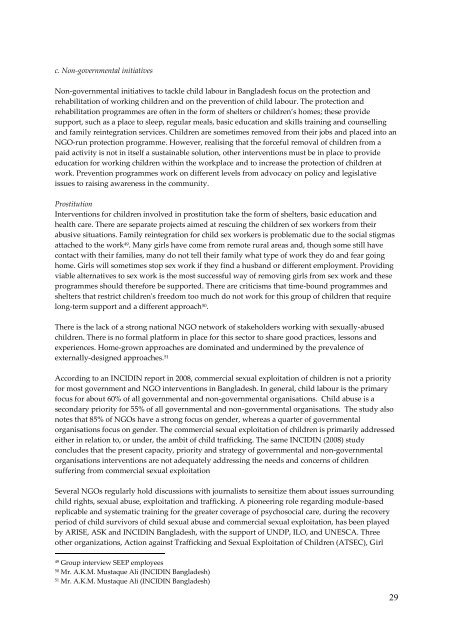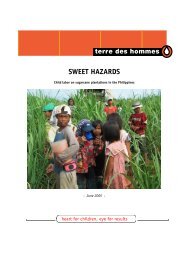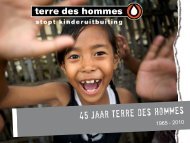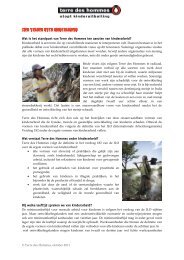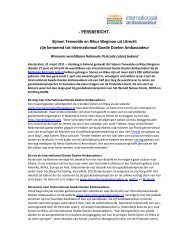Untitled - Terre des Hommes
Untitled - Terre des Hommes
Untitled - Terre des Hommes
- No tags were found...
You also want an ePaper? Increase the reach of your titles
YUMPU automatically turns print PDFs into web optimized ePapers that Google loves.
c. Non-governmental initiatives<br />
Non-governmental initiatives to tackle child labour in Bangla<strong>des</strong>h focus on the protection and<br />
rehabilitation of working children and on the prevention of child labour. The protection and<br />
rehabilitation programmes are often in the form of shelters or children’s homes; these provide<br />
support, such as a place to sleep, regular meals, basic education and skills training and counselling<br />
and family reintegration services. Children are sometimes removed from their jobs and placed into an<br />
NGO-run protection programme. However, realising that the forceful removal of children from a<br />
paid activity is not in itself a sustainable solution, other interventions must be in place to provide<br />
education for working children within the workplace and to increase the protection of children at<br />
work. Prevention programmes work on different levels from advocacy on policy and legislative<br />
issues to raising awareness in the community.<br />
Prostitution<br />
Interventions for children involved in prostitution take the form of shelters, basic education and<br />
health care. There are separate projects aimed at rescuing the children of sex workers from their<br />
abusive situations. Family reintegration for child sex workers is problematic due to the social stigmas<br />
attached to the work 49 . Many girls have come from remote rural areas and, though some still have<br />
contact with their families, many do not tell their family what type of work they do and fear going<br />
home. Girls will sometimes stop sex work if they find a husband or different employment. Providing<br />
viable alternatives to sex work is the most successful way of removing girls from sex work and these<br />
programmes should therefore be supported. There are criticisms that time-bound programmes and<br />
shelters that restrict children's freedom too much do not work for this group of children that require<br />
long-term support and a different approach 50 .<br />
There is the lack of a strong national NGO network of stakeholders working with sexually-abused<br />
children. There is no formal platform in place for this sector to share good practices, lessons and<br />
experiences. Home-grown approaches are dominated and undermined by the prevalence of<br />
externally-<strong>des</strong>igned approaches. 51<br />
According to an INCIDIN report in 2008, commercial sexual exploitation of children is not a priority<br />
for most government and NGO interventions in Bangla<strong>des</strong>h. In general, child labour is the primary<br />
focus for about 60% of all governmental and non-governmental organisations. Child abuse is a<br />
secondary priority for 55% of all governmental and non-governmental organisations. The study also<br />
notes that 85% of NGOs have a strong focus on gender, whereas a quarter of governmental<br />
organisations focus on gender. The commercial sexual exploitation of children is primarily addressed<br />
either in relation to, or under, the ambit of child trafficking. The same INCIDIN (2008) study<br />
conclu<strong>des</strong> that the present capacity, priority and strategy of governmental and non-governmental<br />
organisations interventions are not adequately addressing the needs and concerns of children<br />
suffering from commercial sexual exploitation<br />
Several NGOs regularly hold discussions with journalists to sensitize them about issues surrounding<br />
child rights, sexual abuse, exploitation and trafficking. A pioneering role regarding module-based<br />
replicable and systematic training for the greater coverage of psychosocial care, during the recovery<br />
period of child survivors of child sexual abuse and commercial sexual exploitation, has been played<br />
by ARISE, ASK and INCIDIN Bangla<strong>des</strong>h, with the support of UNDP, ILO, and UNESCA. Three<br />
other organizations, Action against Trafficking and Sexual Exploitation of Children (ATSEC), Girl<br />
49<br />
Group interview SEEP employees<br />
50<br />
Mr. A.K.M. Mustaque Ali (INCIDIN Bangla<strong>des</strong>h)<br />
51<br />
Mr. A.K.M. Mustaque Ali (INCIDIN Bangla<strong>des</strong>h)<br />
29


